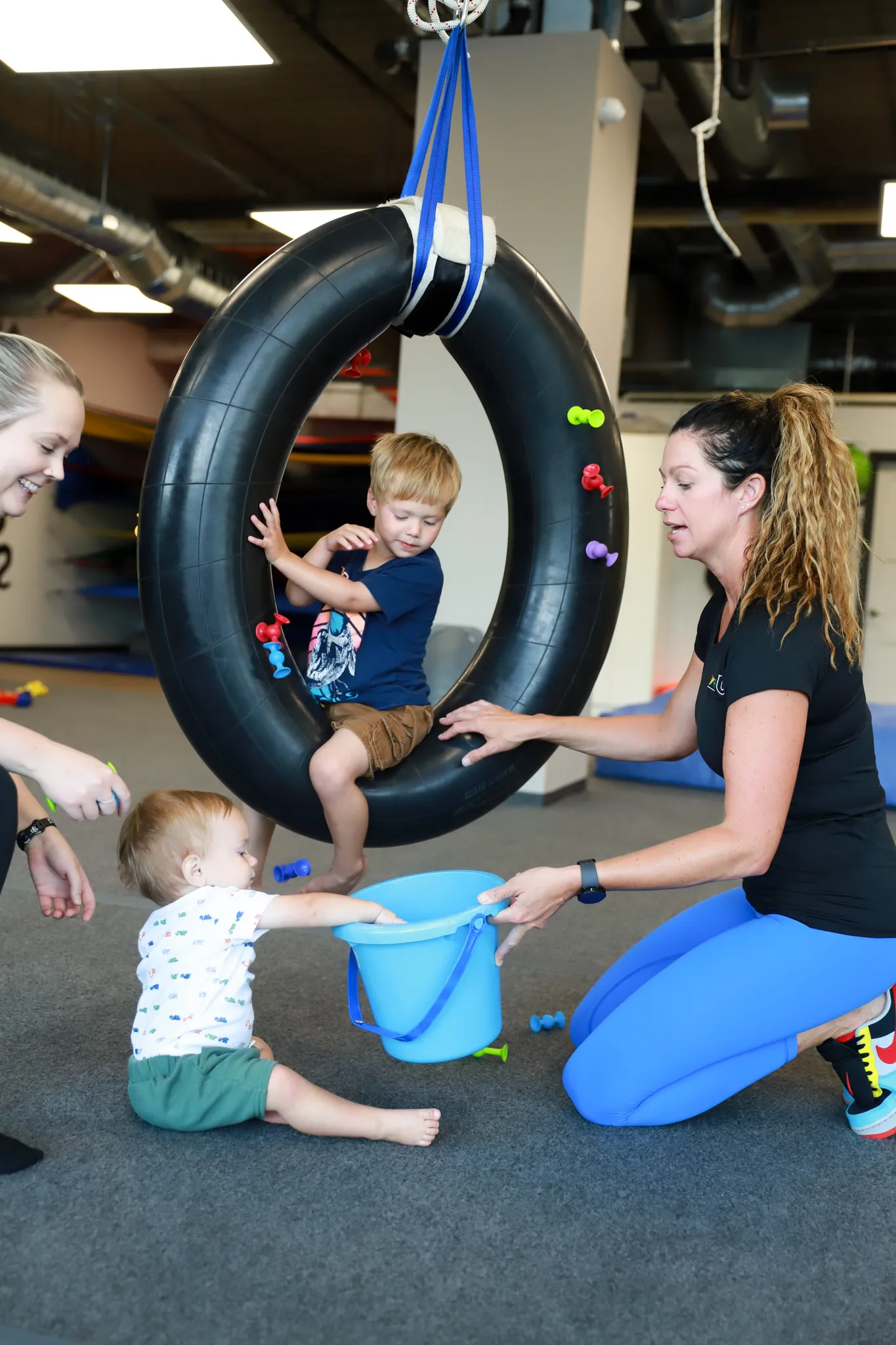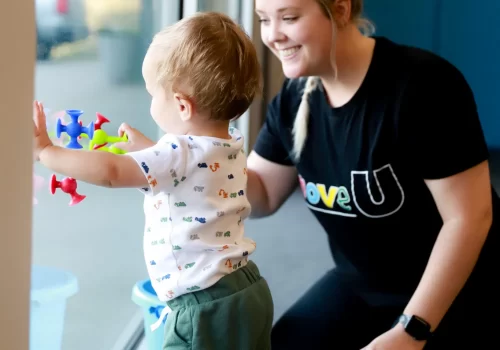Coauthored by: Kristin Wittmayer & Kylee Withrow
Play is the primary occupation, or daily activity, for children. It is an opportunity to follow one’s interests, take risks by trying something new, interact with the world, and develop skills. Play is defined as “an activity that is intrinsically motivating, entails active engagement, and results in joyful discovery” (Yogman et al., 2018). And while it may not always look like it, play is work for our minds and bodies. The benefits of play also lead into lifelong skills.
When we engage in something that brings us a sense of joy, connection, and felt safety, our brain and body are more ready to stretch and grow. This is why the therapists at Move U use play to guide every session with a child. By using play and following the child’s interest, we foster stronger engagement and unity with the child in each session. With this foundation, therapists can then incorporate sensory and motor aspects into the play that create the just-right challenge tailored to the child’s unique profile and goals. The playful experience creates an optimal opportunity to try hard things and discover what we are capable of!
Here are a few of the developmental benefits seen with play:
- Communication and Language: Play is one of the first opportunities for the child to communicate their needs and desires. The communication is not limited to words, either! Our use of sounds, facial expression, and gestures helps us to express and respond to ideas in play. These nonverbal “tools” are precursors to verbal language development.
- Relationships: Play teaches us how to take turns, negotiate, work together, and problem solve. These are essential life skills that your child can apply at school and home. Play is also a great bonding experience with caregivers and friends.
- Regulation and Emotional Wellness: When we engage in joyful & motivating play, our bodies can feel safe. Research shows that participating in play decreases levels of cortisol (a stress hormone) in the body (Nijhof et al., 2018). This can be achieved through co-regulation with a play partner or simply because we are doing something we enjoy, promoting a calmer body. We also learn how to handle our frustrations and adapt effectively when obstacles arise during play.
- Sensory Opportunities- Our senses are vital for us to engage in purposeful play. For example, a back-and-forth game of rolling a ball requires our vision to watch the ball as it moves, our hands’ touch receptors to know when we’ve caught the ball, and our ears to know when we hear “ready, set, go!” from our play partner. Our different sensory systems are constantly retrieving and organizing input to create the “whole picture” of what our body is experiencing in the interaction.
- Motor Learning and Coordination: Play requires us to use our bodies to navigate our environment intentionally and effectively. There are endless ways that play can help us improve our skills with balance, coordination, motor planning, and postural control. Even play that seems primarily sedentary (puzzles, Legos) requires so much of our muscles to keep our posture upright, reach in all directions for pieces, and use coordinated movements with our hands as we handle the game pieces.
The next time you watch your child joyfully participate in their session at Move U, remember that play is a dynamic and engaging medium that is being utilized skillfully to promote growth and learning in many other aspects of daily life. If you’re interested in getting your child scheduled for an appointment with us, request an appointment here.
References:
Nijhof, S. L., Vinkers, C. H., van Geelen, S. M., Duijff, S. N., Achterberg, E. J. M., van der Net, J., Veltkamp, R. C., Grootenhuis, M. A., van de Putte, E. M., Hillegers, M. H. J., van der Brug, A. W., Wierenga, C. J., Benders, M. J. N. L., Engels, R. C. M. E., van der Ent, C. K., Vanderschuren, L. J. M. J., & Lesscher, H. M. B. (2018). Healthy Play, better coping: The importance of play for the development of children in health and disease. Neuroscience & Biobehavioral Reviews, 95, 421–429. https://doi.org/10.1016/j.neubiorev.2018.09.024
Yogman M, Garner A, Hutchinson J, et al; AAP COMMITTEE ON PSYCHOSOCIAL ASPECTS OF CHILD AND FAMILY HEALTH, AAP COUNCIL ON COMMUNICATIONS AND MEDIA. The Power of Play: A Pediatric Role in Enhancing Development in Young Children. Pediatrics. 2018;142(3):e20182058



